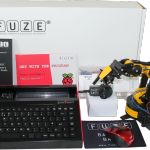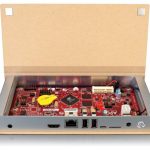Mouse-Box is a complete computer… in a mouse!

Small computers are proving very popular these days. As well as the likes of Raspberry Pi, there are Windows 8.1/Linux devices like Intel's Compute Stick on the way, and fans of Linux Mint can purchase the CompuLab MintBox Mini. Given the size of this new generation of diminutive device, it’s perhaps surprising that no one has (successfully) tried to squeeze a PC into a mouse before.
Well, now, finally they have. Mouse-Box aims to be a complete computer inside in a fully functioning pointing device. You’ll be able to use it with your normal PC, and then switch to the Mouse-Box computer with ease. You just need access to a screen and keyboard (you already have the mouse!)
The FUZE gets an update and new features

It was over a year ago that the FUZE, a machine aimed at getting a new generation interested in programming, hit the market.
Now there's a revised T2 version of the Raspberry Pi- based machine that brings a number of useful updates and new features.
Kinivo releases a pair of inexpensive Linux-friendly USB wireless adapters

Nowadays, if you buy a laptop, it will have a built-in wireless card (desktops; not always). For the most part, these integrated cards work well -- on Windows. You see, most manufacturers build their machines with only Windows in mind. If you only use Microsoft's operating system, you should be golden. However, for nerds that like Linux (including myself), nonexistent or problematic wireless drivers can be an absolute nightmare.
This is why I recommend a USB wireless adapter to every Linux user; you never know when you may need it as permanent or temporary internet solution. Unfortunately, not all USB adapters work with Linux out of the box, so the model you choose matters. Today, Kinivo releases two USB wireless adapters that are promised to work with Linux-based operating systems.
BBC aims to make programming sexy with new coding TV shows for kids

The BBC is looking to create a new generation of code monkeys with a programming push in schools throughout England. Of all the subjects available to study at school, computer science, IT, computing (call it what you will) isn’t exactly, you know, sexy and exciting, but the Beeb is hoping to change that. Back in the 1980s the BBC -- the UK's license free subsidized public service broadcaster -- spearheaded a drive to popularize computing in general, but particularly programming. Three decades later, the new initiative includes plans for not just one, but several programming-themed TV shows aimed at children.
The BBC has already held talks with Microsoft, BT, Google and Samsung, and has managed to sign agreements with between 10 and 20 partners to help with the new endeavor. In addition to the TV shows, there will also be a range of study guides and other material made available at BBC Bitesize, the broadcaster's online education resource. Jessica Cecil, controller of the BBC's coding and digital creative initiative, said: "It's about giving the next generation a chance to shape their world, not just be consumers in it."
Wearable technology is easily tracked

Users of wearable technology can have their information tracked with just $70 worth of hardware, according to a new study.
Research carried out by security firm Symantec used a simple set-up combining a Raspberry Pi computer and a Bluetooth radio module, to scan for signals. The technology was taken to parks and sporting events where it was able to record data being broadcast from gadgets close by.
What happens now that phones can see?

Photos give us a window to the world -- our own experiences can only show us so much. Photos give us a richness of experience and perspective that we would otherwise be devoid of. The sudden existence of billions of smart phones, which take trillions of photos and videos per year, has given us the biggest increase we’ve seen yet in rich user data -- and now we have the technology to start to make sense of that data.
With this new technology, it’s now possible to analyze photos for myriad applications. For example, at Jetpac we use 100s of millions of travel photos shared on Instagram to develop the Jetpac City Guides app, and do object recognition on the photos to be able to recommend places such as restaurants with patios (from the blue skies in the photos), hipster bars (by the unusually high number of mustaches we spot in photos), and the best coffee shops (from the highest proportion of latte art in photos). We've also now developed deep learning AI technology to broaden our ability to be able to recognize all objects in photos. Putting deep learning on the iPhone (Spotter by Jetpac) means we can now recognize many objects from the iPhone's real-time video feed, locally on the phone. Having minimized the technology significantly, we also have room to allow you to train the phone to recognize a specific object (Deep Belief by Jetpac).
Don't want Glassholes using your Wi-Fi? Ban Google Glass!

Do you hate Google Glass? Does your blood run cold whenever you see one of those human cyborgs coming towards you? Well one New Zealand designer has come up with a solution: cut off their Wi-Fi.
Berlin-based Julian Oliver has released a simple program that he calls Glasshole.sh, designed to detect any Glass device attempting to connect to a Wi-Fi network and block its access.
AMD AM1 platform -- build a great PC without hurting your wallet [Review]

Money is the key to solving many of life's problems. If you have cash, you can just throw it at your problems and like magic, they go away. Computer-building is the same way. I mean, if you want a nice computer, you only need to buy quality parts. However, throwing money at a system-build is the coward's way. For a system build to impress me, it should be a mix of power and value. Most importantly, it shouldn't be wasteful. For example, if you buy 16GB of RAM and dual graphics cards to run in SLI, but all you want to do is surf the web, you have failed. You should have saved some money and built a more tame computer. Now, there is nothing wrong with planning on the future and building for perceived possible future needs, but it is easy to overdo it.
When I first caught wind of AMD's AM1 platform, I was immediately intrigued. Like I said, I am impressed with value and this new platform certainly meets that criteria. If you aren't familiar, the AM1 platform is socket-upgradeable and extremely affordable. The system I have been testing has a motherboard that sells for $35 and a processor (APU) that costs $60 and that is on the higher end of the platform! Excited? Read on.
Happy first birthday BitTorrent Sync

It's hard to believe that it has been one year since BitTorrent released its Sync app. I was among the first testers when it was in private alpha, and it came at a welcome time, as Microsoft had announced it was killing Live Mesh, an app I used between my desktop and laptop.
Since then, Sync has gone to beta and then final release. It even released a Kindle Fire app just recently, adding even more integration with your home. It was already available for Windows, Mac, iOS, FreeBSD, Android and NAS.
Microsoft All-in-One Media Keyboard is ready for some HTPC action

Over the years, many hardware companies have had varying levels of quality. However, there are two companies that you can almost always depend on for solid input devices -- Logitech and Microsoft. Both of these companies make phenomenal mice and keyboards. Sure, there are missteps every once in a while, but for the most part, their hardware can be trusted to work well and last long.
Last week, Logitech announced the brilliant Illuminated Living-Room Keyboard K830 -- a combination keyboard and trackpad. It is an elegant solution (BetaNews will be reviewing it soon), but is a bit pricey at $99. Today, Microsoft announces similar hardware, called the All-in-One Media Keyboard. The price? A very low $39. Is this the perfect low-cost solution for HTPC and Raspberry Pi?
Logitech announces HTPC-friendly Illuminated Living-Room Keyboard K830

Home-Theater PCs (HTPC) are a bit of a dying breed. While many people still build and use them, the rise of media boxes and dongles have rendered them a bit unnecessary. After all, something like a Roku takes up far less space, costs less and uses much less electricity than a full-fledged PC.
However, HTPCs still have their place in some homes. And so, high quality wireless pointing devices and keyboards are still desired by some consumers. Hell, I run XBMC on Raspberry Pi in my living room and have a need in that regard too. Today, Logitech announces a solution for these users, with the Illuminated Living-Room Keyboard K830.
For HTPC folks, XBMC recommends an upgrade from Windows XP to Linux

It's doubtful there are many people out there at this point that don't already know that support for Windows XP will come to an end tomorrow, April 8th. Despite that, a number of individuals and businesses will continue to run the operating system.
This doesn't likely apply to those maintaining an HTPC, as this tends to be a more geek-savvy set, but no doubt a few are out there. For those users, XBMC has passed its judgment, and the verdict is Linux.
XBMC 13 Beta 1 released, adds limited 3D support, hardware decoding to Android devices

Team XBMC has unveiled the first public beta of XBMC 13.0, its open-source, cross-platform media server and center. Version 13.0, codenamed "Gotham", ships after more than a year of development, and is packed full of new and improved features.
Chief among these are limited support for stereoscopic 3D rendering, improved touchscreen and UPnP capabilities, Android hardware decoding and what Team XBMC terms "dramatic" audio engine enhancements.
Yarn, ribbon and breached computers -- Michaels (possibly) gets hacked

Michaels is a pretty cool store, if you are into crafts. If you have a need for things like yarn, pipe-cleaners or fabric, it is a fabulous place. Heck, tech nerds can have fun there too -- they can build a Raspberry Pi case out of popsicle sticks.
However, there is one thing consumers don't expect to get at the craft store -- their credit cards compromised. Yes, Michaels joins Target as the latest victim of hackers...maybe. You see, sadly, it seems Michaels is not sure what exactly may have been breached (if anything).
New raft of partners to help push Firefox OS in 2014

Firefox OS may have been with us since last year, but it's yet to make any sort of headway into the market. At CES, a new batch of partners has been unveiled which it is hoped will propel Firefox OS to mass popularity. Just as Android is not limited to use in phones and tablets, so Firefox OS has applications in other areas, and this is something demonstrated by the latest partnership with Panasonic. Working with Mozilla, the company will produce Firefox OS-powered smart TVs.
But of course there is great scope for Firefox OS to be used as a mobile platform, and this has already been explored to some extent. ZTE has produced a phone running Mozilla's operating system and in the coming year the company will be developing a "new Firefox OS line to give users more choice". But the success of an operating system is not just about getting customers on board -- developers are also vital.
© 1998-2025 BetaNews, Inc. All Rights Reserved. About Us - Privacy Policy - Cookie Policy - Sitemap.